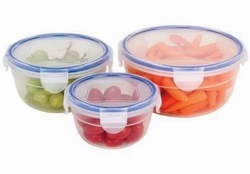 Just because you buy organic and avoid storing your food in plastic containers does not necessarily mean that the toxic plastics chemical bisphenol-A (BPA) is no longer in your food. A recent study published in the Journal of Exposure Science and Environmental Epidemiology has revealed that BPA and certain other endocrine-disrupting chemicals may still be problematic for health-conscious individuals, and that more regulations are needed to protect the general public from the unseen poisons lurking in the food supply.
Just because you buy organic and avoid storing your food in plastic containers does not necessarily mean that the toxic plastics chemical bisphenol-A (BPA) is no longer in your food. A recent study published in the Journal of Exposure Science and Environmental Epidemiology has revealed that BPA and certain other endocrine-disrupting chemicals may still be problematic for health-conscious individuals, and that more regulations are needed to protect the general public from the unseen poisons lurking in the food supply.Based on a small-scale trial involving 10 families, researchers from University of Washington (UW) School of Public Health and the Seattle Children's Research Institute found that even when families ate a steady diet of mostly fresh, organic food not stored in plastic containers containing BPA, their exposure levels to both BPA and phthalates, another toxic plastics chemical, were still remarkably high. In fact, compared to families eating a "mainstream" diet, those fed specially-catered organic and local foods had higher-than-normal metabolite concentrations of phthalates and BPA in their urine.
For the study, five of the 10 families were given simple handouts advising them on how to avoid BPA and phthalates when shopping for and preparing food, while the other five families were fed already-prepared meals made from foods that were not stored in plastic, and that were local and organic when available. All participants from both groups had their urine tested for the two chemicals at the beginning of the study and again after five days of undergoing the two protocols.
Much to their surprise, the researchers found that the organic, seemingly BPA-free group experienced doubled BPA levels in their urine at the end of the five-day period, while the handout-only group saw no change in urinary concentrations of the chemical. After going back and testing a range of ingredients to identify why this may have been the case, the researchers discovered that dairy products stored in glass bottles and organic, imported ground coriander had unusually high levels of DEHP, a "gender-bending" phthalate compound that is banned in Europe but still used in the U.S.
"Current information we give families may not be enough to reduce exposures," explained Dr. Sheela Sathyanarayana, lead author of the study. "It's difficult to control your exposure to these chemicals, even when you try. We have very little control over what's in our food, including contaminants. Families can focus on buying fresh fruits and vegetables, foods that are not canned ... but it may take new federal regulations to reduce exposures to these chemicals."
Steer clear of metal soup cans, plastic containers, and thermal paper receipts
Admittedly, the bottled dairy and the ground coriander were the only two ingredients used in the organic portion of the study that tested high for phthalates, which suggests that these particular items are atypical sources of exposure and not necessarily common throughout the general food supply. This is evidenced by the fact that a similar study conducted in 2011 arrived at much different results, having found that organic, fresh food is a much less likely sources of both phthalates and BPA.
And yet at the same time, Dr. Sathyanarayana says dairy products and spices in general are common sources of phthalates, and that consumers need to beware. Besides avoiding the more obvious sources of contamination such as plastic containers and packaging and metal food cans, people need to continue seeking out fresh, organic, and hopefully safety-tested foods that are free of chemical contamination, and also avoid touching thermal paper receipts, which are another common source of BPA.







